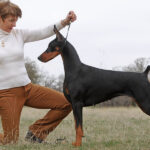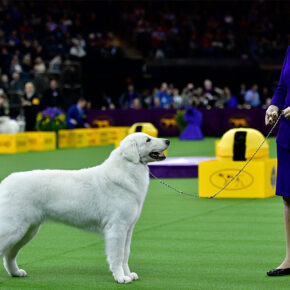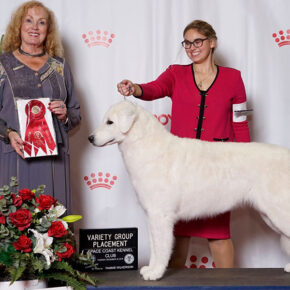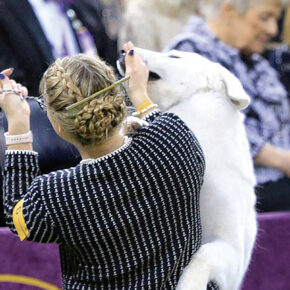CAROLINE CLEGG
Interview with Junior Handler
BIS Magazine USA December 2020 issue

Photo credits: Rhonda Cassidy
Q: Hello Caroline, please tell us something about your beginnings. When did you get your first dog and how did you get an idea to start going to the shows?
A: I was lucky enough to have parents that were involved in dogs for many years before I was born. My parents were professional all-breed handlers and brought me to shows every weekend as a child but then retired once I started school. I was four years old when I showed my first dog, which was the Golden Retriever that my dad was campaigning. He was special at the time, and I won Best of Breed under Judge Donna Buxton. My parents never pressured me to show dogs, but I was always jumping at the chance to run around the ring like my parents.
Q: When did you start participating in dog shows as a junior handler and how was your first experience?
A: My parents and I talked about starting in juniors before I turned nine. I was apprehensive at first because I loved to show in the breed ring, but eventually we decided it would be a great learning experience for me. On my ninth birthday, I competed in juniors at our home show in Cincinnati, Ohio and was honored to win Best Junior Handler from the novice junior class under Judge Scott Pfeil with my Golden Retriever puppy. After that day, I was absolutely hooked and continued to show in juniors until I aged out.
Q: When you started did you have any mentors or people who were helping youwith an introduction into the world of dog showing and the rules of junior handling?
A: I was blessed to have such a large dog show family that knew me and who I looked up to. When I started juniors, I started to learn from other handlers by either talking and practicing with them, or just watching them show their dogs in the ring. Amy Booth, Clint Livingston, Nina Fetter, Angela Lloyd, Wally Sommerfelt, Peter Gaeta, and Barbara Alderman are some of the people that truly helped shape me as a handler and gave me so much insight. These people are very accomplished handlers, breeders, and judges that have an extreme wealth of knowledge and love to help the younger generations.
Q: You won third place in junior handling at the Garden this year, please tell us everything about it. Which dog were you showing and how did you choose him? How did you feel entering the ring at the Garden and finishing third?
A: It was truly a dream come true for me. Since I started in juniors, my goal was always to try and make the finals at Westminster, and it finally happened this year. I was showing a Golden Retriever named Frankie, who we acquired from a breeder/ friend of ours the year prior. We reached out to her for this dog specifically because the dogs that I have used in the past were females that I was planning to breed and would be out of commission for the time being. My father and I fell in love with him at a show because he is an older style Golden, which is our type, and was a big, blonde, beautiful dog that we thought I could have some success with. As I was already aged out, I knew that my last two shows for juniors would be the AKC Tournament and Westminster. It was always my dream to end my juniors career just like I started which was with a Golden. I was so excited to walk on the big green carpet again and to do it with a Golden for the first time, since I had already been in the group ring with my Kuvasz. Being in the middle of the Garden always makes me feel like I have electricity running through my veins which is euphoric. I was already thrilled to make the finals, so to be placed was just the cherry on top for me, and I got to celebrate with one of my best friends who won Best Junior that year.
Q: Do you have someone helping you improving your skills nowadays?
A: I try to gain as much knowledge and experience from anyone I can, so I have started to work as an apprentice for a few handlers for the past couple of years. Currently, I work for Lisa Bettis who is an extremely accomplished handler. She is sharing a lot of grooming and handling expertise with me in fields that I am not experienced in such as trimming, terriers, and excess hair. Besides these specific fields she also teaches me something new every day such as a handling tip or a business strategy. Working for handlers who excel in a specialty, such as Lisa Bettis with Bichon Frises and Afghans, is the best way to learn in dogs.
Q: How would you describe the relations between junior handlers? How friendly and helpful are they with each other?
A: Just like in every sport there are good and bad, but as a majority, most kids love to learn and help one another. Everybody makes friends with other juniors, both older and younger, and learn from each other as they age. The competition really helps kids grow a good sense of sportsmanship when they compete with their friends every weekend.
Q: Seminars on handling and grooming are very educational. Whose seminar would you like to attend?
A: I always love attending different seminars and helping when I can, but breed/ specialty specific seminars are the most educational in my opinion. For example, I attended the best seminar I ever have been to last year which was focused on Poodles and put on by Allison Foley. She spent a whole day teaching us about the breed, grooming, showing, and answering all our questions. The following day was another handling seminar run by both Allison Foley and Will Alexander which helped individuals improve their handling skills with their personal dog. I would attend any seminars led by them again and again. There are plenty of seminars on general handling skills, which are phenomenal, but I would love to see more seminars that teach about a certain specialty such as terriers or trimming. I would also want those seminars to be taught by renowned handlers and/ or breeders such as Gabriel Rangel, Ernesto Lara, Bill McFadden and the like.
Q: Lately there are many big handlers searching for assistants. What do you think handlers are expecting from assistants?
A: Work ethic. Most handlers don’t care about how much experience someone does or does not have because they will be willing to teach you. What they do care about is how hard you work and the dedication you give to them and the dogs. If you are a junior working for a handler they know when they hire you that you may not have much experience, but they will want to teach you if you ask them and give them your hard work and sweat in return. This means from the second you wake up you do not stop until the day is done, no phones, no messing around with friends. The key is having a good attitude, and your work is in exchange for valuable knowledge.
Q: What are assistants looking to learn from professional handlers besides knowledge?
A: Good assistants that want to work and learn will be looking for a handler who is willing to give their time and knowledge to them. They want to be in a safe and appreciative environment where their hard work is appreciated and maybe some camaraderie. No one wants to work for someone who doesn’t appreciate how hard they are trying and is grumpy all day. In contrast, I do not expect anybody to be elated throughout the entire day of a show, that is impossible, but a cheery set up is always more attractive to a young assistant than a gloomy one.
Q: What about the future? Do you plan on pursuing a career as a full-time professional handler or do you have some other dreams?
A: I do want to show dogs and continue my breeding programs, but I also want to carry on my family’s small businesses outside of dog shows so that I don’t have to rely on shows in a rapidly changing world. I am currently working on my degree in business entrepreneurship to help shape my mind for business so that I can handle and breed dogs successfully while also pursuing other dreams.
Q: Do you have other hobbies?
A: I like to consider myself a mediocre bookworm, so I love listening to audiobooks while I travel or groom my dogs at shows. I also love to try and find new music for my ever-growing playlist, which is now over 37 hours long.
Q: How do you manage your school and time for traveling?
A: This year is certainly quite different because of COVID-19, but my key to success in both high school and college has been to try and get ahead on my school work during the week so I have more time on the weekends to enjoy the shows. However, it was quite common to see me working on my computer at a grooming table during the day at a show. Another insider tip would be to have personal relationships with your teachers and professors. I always explained to my teachers during the first week of school my passion for dogs so that they could understand why I would periodically miss school. If you work hard to be a good student, they will see that and normally help you succeed in your school career as well.
Q: Do you have any advice for young people interested in becoming a junior handler?
A: My biggest advice is to find yourself a mentor. This could be someone in a breed that you are interested in, or a handler that you really admire. Go up to them, start a conversation and ask for their help and advice. Most people will want to help you and share their knowledge and experience with you, but they never will if you don’t ask them first. Do not be dissuaded if they say that they are busy during the day. There is a difference between being busy and saying no, this is their place of work. Also, please ask them yourself and do not make a parent do it for you. The handler will prefer if you ask yourself because it shows that you care and have some ambition. Ask them if after the day is done they could help you groom your dog, or ask them to watch you present your dog and ask for critiques. If you listen to their advice and use it, they will want to help you and it could also create a great friendship.






